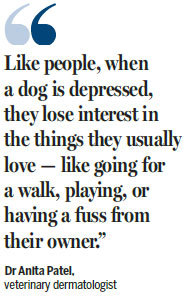How to spot if your dog is depressed, and how to handle it
Scientists have discovered that itching and scratching are tell-tale signs
There's nothing like a good scratch.
However new research has shown that far from the picture of satisfaction and contentment, itching and scratching is a telltale sign of depression in dogs.
Scientists discovered that dermatological issues are not only one of the most common health problems among dogs - they're also one of the biggest causes of stress and anxiety.

One in six trips to see a vet are due to skin problems for dogs. And 75 per cent of dogs diagnosed with dermatological issues suffer depression meaning thousands of pets are probably suffering from the blues.
A series of studies by Zoetis, the world's leading animal health company, showed that dogs suffering depression exhibit many of the same traits as people.
The most common symptom was being less playful, followed by being less sociable with people, restlessness, decreased appetite, and interacting less with other dogs.
Itching and scratching could be a warning sign that your dog is depressed
And depression in dogs has a knock-on effect on their owners, with 80 per cent saying their pet's condition diminished their own quality of life as well.
Dr Anita Patel, one of Britain's leading veterinary dermatologists, said: "Most people assume that itching and scratching is totally normal dog behaviour. The odd scratch is fine but when you see a dog frequently itching, scratching, nibbling or licking themselves, that's a strong sign of a skin condition. Left untreated, this can exacerbate the problem and lead to more serious issues.
"What's not been properly understood previously is how dermatological problems can affect a dog's wellbeing. What we now know is that skin issues can be one of the biggest causes of depression for dogs. And like people, when a dog is depressed, they lose interest in the things they usually love - like going for a walk, playing, or having a fuss from their owner."
Itchiness in pets - known as pruritus - is defined as an unpleasant sensation that provokes the desire or reflex to scratch.
It is common in many types of skin disorders and is often accompanied by red, inflamed areas of skin and may lead to pyoderma - infection of the skin.
Analysis of more than 80,000 veterinary appointments at more than 200 practices across the UK found the condition is most common around the ears, accounting for 44 per cent of cases, or around the legs and feet - 27 per cent.
Experts say that consistent itching, scratching, nibbling, biting and licking in dogs is not normal behaviour and owners should seek veterinary help if they see these symptoms.
Allowing a dog to continue to itch and scratch can lead to skin damage with potential for creating a secondary infection requiring antibiotic treatment.
Flea allergy is one of the most common causes of the condition, so summer is the season when dogs are most likely to develop it. Pet owners are urged to use parasite prevention treatments to avoid pruritus in the first place.
It can also be caused by food and contact allergies to shampoo or other household products, while the more serious atopic dermatitis is associated with environment allergens such as pollen and dust.
If allergies are untreated the dogs can get a skin infection and need to be treated with antibiotics prescribed by their vet.
However, for dogs already suffering pruritus, combating the condition has historically been difficult because existing treatments are typically steroid-based and can lead to numerous side effects.
But a new single injection is targeting the itch signalling in the brain. It works neutralising the protein triggered by the immune system which tells the brain to scratch.
Cytopoint has just been granted marketing authorization by the European Commission and is now being launched in UK.
It is available through veterinary practices and is administered through a single injection.

(China Daily 08/12/2017 page23)














